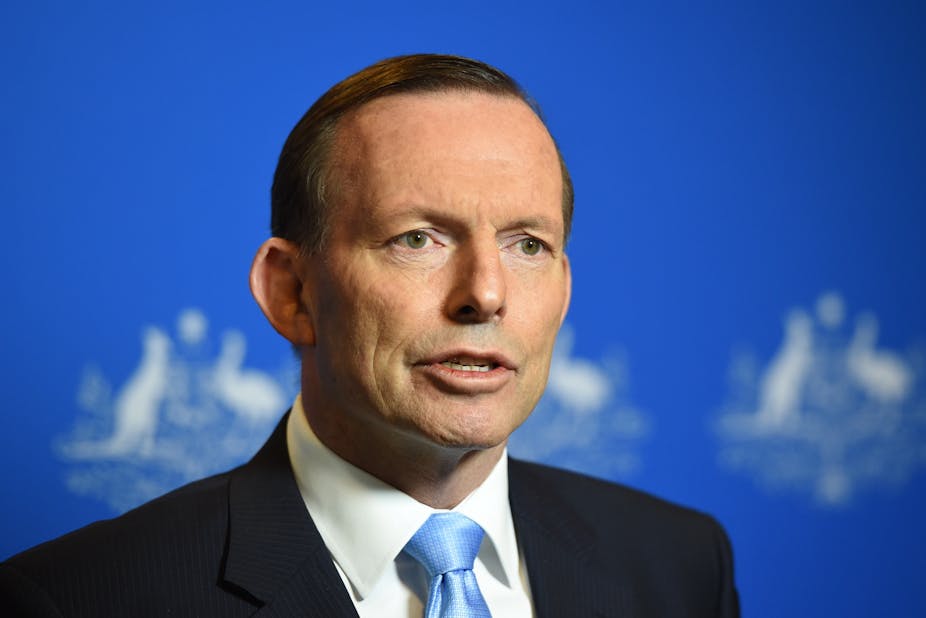As we approach the first anniversary of the Abbott government coming to office, The Conversation is examining how the Coalition has fared in remaking Australia and keeping its election promises.
Labor prime minister Paul Keating’s famous warning on the eve of his 1996 election defeat – “when the government changes, the country changes” – was only partly correct. Reforming governments have attempted to transform Australia’s political culture and have occasionally succeeded, but certain elements seem impossible to dislodge.
Perhaps the most enduring is Australia’s strong welfare state: unemployment benefits and other pensions, free and universal health care, free primary and secondary education, mild wealth redistribution via progressive taxation. The popularity of this suite of social democratic policies is reflected in that most Australian of maxims, the “fair go”.
Despite a number of pre-election promises to the contrary, the Abbott government has embarked on a bold ideological mission to transform the way Australians relate to the state. Treasurer Joe Hockey calls it “the end of the age of entitlement”, which:
… will involve reducing the provision of so called ‘free’ government services to those who feel they are entitled to receive them.
This campaign has been urged on by the government’s cheerleaders in the right-wing press and the much-maligned yet ubiquitous Institute of Public Affairs (IPA). Given half a chance, the IPA would remake Australia as a free-market, individualist utopia straight out of their libertarian fantasies.
Despite his sycophantic promise in opposition to give “a big fat yes” to the IPA’s political wishlist, I have previously been sceptical of prime minister Tony Abbott’s commitment to its worldview. But the extent to which his government has adopted the IPA’s language as they try in vain to transform Australian political culture has been a surprise.
My expectation was for Abbott to lead a cautiously conservative government, so frightened are modern politicians of fortnightly opinion polls and the daily outrage merchants in the press, on television and radio, and on social media. Instead, he and his senior colleagues seem intent on upsetting as many constituencies as possible.
The government has also tried to take the focus off its unpopular budget policies with misguided “culture war” tactics, showing all of the hardline ideology but none of the political savvy of John Howard at his most effective. The result has been a clumsy mish-mash of petty and divisive politics, serving only to make the government appear incompetent and lacking in direction.
To begin at the top, Abbott bizarrely re-instituted knights and dames into the Australian honours system in March. Even Howard, as monarchist and traditional as they come, found this “somewhat anachronistic”. More recently, while justifying proposed anti-terror laws, Abbott tried to appeal to blind nationalism with his inane “Team Australia” rhetoric.

Meanwhile, the unfortunate attorney-general, George Brandis, has presided over the disastrous (and now canned) attempt to amend Section 18C of the Racial Discrimination Act. His personal appointee to the Human Rights Commission, former IPA staffer Tim Wilson, argued that this section “has a chilling effect on freedom of speech”.
Debating the changes in the Senate, Brandis arrogantly declared that “people do have a right to be bigots, you know”. However true in principle, the statement only served to confirm the suspicions of many: that the government was more interested in upholding the rights of racists than protecting the targets of their abuse.
Legal protection for vulnerable minority groups remains popular. The government seems to have conceded this in backing down on the reforms, much to the IPA’s chagrin.
Not to be outdone in the political ineptitude stakes was employment minister Eric Abetz. Already struggling with the task of selling one of the budget’s more punitive measures – denying young jobseekers unemployment benefits for up to six months – Abetz decided to do some ideological freelancing.
Defending his involvement in the Christian conservative World Congress of Families conference – opened by social services minister Kevin Andrews – Abetz appeared to endorse the discredited link between abortion and breast cancer. He later backtracked and was publicly rebuked by Abbott, but the damage had been done.
Abetz and Andrews would clearly like to be able to air their anti-abortion views more openly, but they are faced with the fact that the abortion debate in Australia is essentially over. Their side lost.

These are just a few of many entirely avoidable political blunders made by government frontbenchers to date. Together with unpopular budget proposals such as the A$7 co-payment for GP consultations and Hockey’s pitiless view of the poor, they reveal the government to be utterly tone-deaf when it comes to matters of political ideology.
Such views may be popular among passionate minorities such as the IPA and the Christian Right, but they aren’t shared by the majority of Australians. The sooner our leaders realise this, the sooner they might start looking like an “adult government”, rather than a cabal of right-wing zealots direct from student politics.
Like the clueless British recruits in the First World War musical Oh, What a Lovely War!, the Abbott government opened hostilities with glee, brimming with confidence about a quick and easy victory. But as the political casualties pile up, enthusiasm for the culture war looks to be waning. This can only be a good thing, both for the government and the country.
This is the first piece in The Conversation’s Remaking Australia series. Stay tuned for more over the next week.

